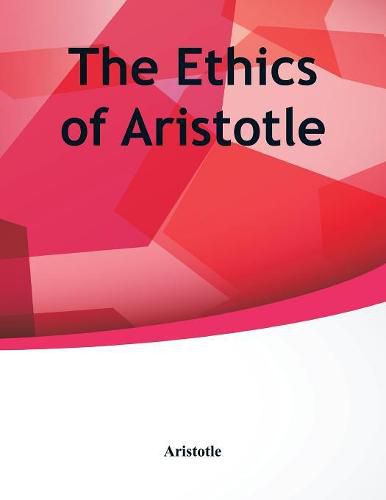Readings Newsletter
Become a Readings Member to make your shopping experience even easier.
Sign in or sign up for free!
You’re not far away from qualifying for FREE standard shipping within Australia
You’ve qualified for FREE standard shipping within Australia
The cart is loading…






This title is printed to order. This book may have been self-published. If so, we cannot guarantee the quality of the content. In the main most books will have gone through the editing process however some may not. We therefore suggest that you be aware of this before ordering this book. If in doubt check either the author or publisher’s details as we are unable to accept any returns unless they are faulty. Please contact us if you have any questions.
Aristotle conceived of the term ‘ethics’ as a way of examining the moral thought of his teacher Plato, and Plato’s contemporary Socrates. Wishing to keep a simple definition, Aristotle conceived of ethics as the moral and behavioural ideal of the way in which human life is conducted.
The philosopher’s principle work of moral philosophy is entitled Nicomachean Ethics, and is comprised of ten distinct books. In order to properly define ethical behaviour, Aristotle attempts to conceive of a society that is ideal in the sense of securing the maximum happiness for the entire population. After defining the nature of happiness, Aristotle commences to discuss the various virtues people may aspire to in order to live ethically.
Various topics are discussed as the discussion evolves, with concepts such as justice and asceticism, touched upon throughout the text. Aristotle is keen to emphasise the various human emotions which can curtail the human being who aspires to be ethical, and emphasises that the journey to becoming a decent and upstanding person involves a high degree of self-mastery.
Having first appeared in 1908, the iteration of the Ethics presented here has stood the test of time. It continues to be cited and favoured by numerous scholars to this day, being as it faithfully replicates the timeless thoughts, ideas and reflections of the Ancient Greek philosopher Aristotle.
$9.00 standard shipping within Australia
FREE standard shipping within Australia for orders over $100.00
Express & International shipping calculated at checkout
This title is printed to order. This book may have been self-published. If so, we cannot guarantee the quality of the content. In the main most books will have gone through the editing process however some may not. We therefore suggest that you be aware of this before ordering this book. If in doubt check either the author or publisher’s details as we are unable to accept any returns unless they are faulty. Please contact us if you have any questions.
Aristotle conceived of the term ‘ethics’ as a way of examining the moral thought of his teacher Plato, and Plato’s contemporary Socrates. Wishing to keep a simple definition, Aristotle conceived of ethics as the moral and behavioural ideal of the way in which human life is conducted.
The philosopher’s principle work of moral philosophy is entitled Nicomachean Ethics, and is comprised of ten distinct books. In order to properly define ethical behaviour, Aristotle attempts to conceive of a society that is ideal in the sense of securing the maximum happiness for the entire population. After defining the nature of happiness, Aristotle commences to discuss the various virtues people may aspire to in order to live ethically.
Various topics are discussed as the discussion evolves, with concepts such as justice and asceticism, touched upon throughout the text. Aristotle is keen to emphasise the various human emotions which can curtail the human being who aspires to be ethical, and emphasises that the journey to becoming a decent and upstanding person involves a high degree of self-mastery.
Having first appeared in 1908, the iteration of the Ethics presented here has stood the test of time. It continues to be cited and favoured by numerous scholars to this day, being as it faithfully replicates the timeless thoughts, ideas and reflections of the Ancient Greek philosopher Aristotle.